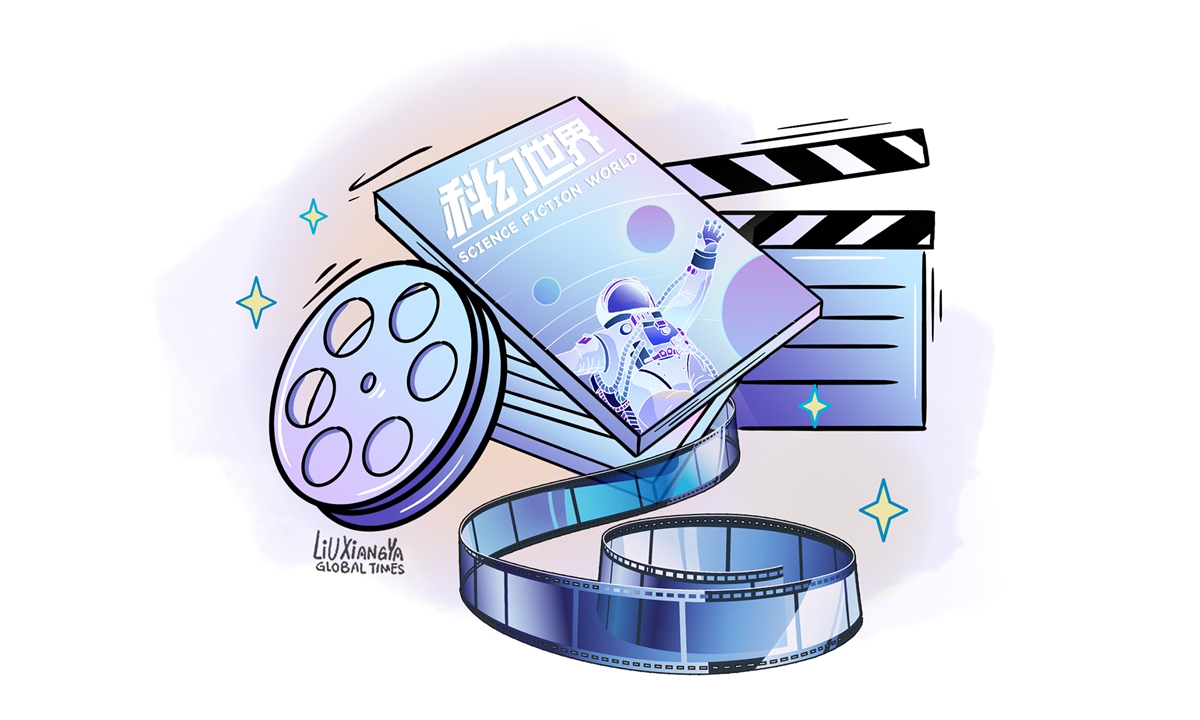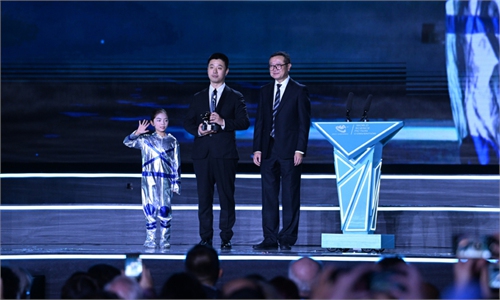ARTS / FILM
China’s booming sci-fi novels, films let imagination fly high

Illustration: Liu Xiangya/Global Times
A few days ago, the Science Fiction Film Working Committee of the Chinese Film Association was founded during the China Golden Rooster Film Festival, a solid step taken to promote Chinese science fiction films and novels. The two are often closely connected and constitute a support for each other.
It is generally known that many science fiction films are adapted from science fiction novels.
The first novel of this genre was Frankenstein written by noted British writer Mary Shelley in 1818, followed by numerous works. However, original works of such literary genre were not available in China until the 1980s, except for brief introductions given by some Chinese writers in the early 20th century.
The magazine Ke Xue Wen Yi (Science Arts) founded in 1979, was one of the few magazines that published science fiction for teenagers, but at the time the publication wasn't very popular, as topics such as spacecraft, extraterrestrials as well as time travel were deemed too far away from our ordinary life.
Some people even questioned the value of science fiction, calling it "pseudo-science," so the fledgling literary genre had gradually stalled in China.
Despite such humble beginnings and dim prospects, the editors of the magazine were so enchanted by the marvel of a science fiction film entitled Dead Light on Coral Island back then that they were determined to keep the magazine running.
In 1991, they changed the magazine name to Ke Huan Shi Jie (Science Fiction World) targeting middle school and college students.
Some of the most well-known Chinese science fiction writers of today were among those young readers, including He Xi, Han Song, and Liu Cixin, whose novel Three Body was published on it and won the Hugo Award in 2015.
Nowadays, it seems that more and more people get their first access to science fiction through films or TV dramas that were adapted from novels.
As an editor for many famous science fiction writers over the past 20 years, Yao Haijun, deputy editor-in-chief of Science Fiction World said, "I really feel that it is only natural that science fiction often develops from books to films, as publications have laid a solid foundation for films, and films will also promote the growth of publications."
However, Chinese science fiction has undergone a difficult journey.
"When The Wandering Earth started to be filmed, it seemed very luxury to make a Chinese science fiction film," recalls Gong Ge'er, scriptwriter and producer of the film, but four years later, they made a second one, which marked "a new beginning."
"I really think that the growing Chinese science fiction market is bringing in a larger Chinese audience, who feel more confident toward Chinese science fiction," added Gong.
After the films The Wandering Earth I and II and the TV Drama Three Body were released, a fever for science fiction was sparked among Chinese audience.
In 2023, The Wandering Earth II gained over 4 billion yuan ($547.6 million) box office according to youth.cn, and won the Special Jury Award at the just concluded Chinese top film festival.
It has also been announced that The Wandering Earth III is expected to be released in 2027.
In recent years, the adapted films from science fiction IPs and novels have boomed, reflecting China's growing technological strength and AI film production capability.
According to the 2023 Chinese Science Fiction Industry Report, in 2022, ten science fiction films were screened, and among the top 10 domestic box office earners, four are China's science fiction films.
Under such influence, more and more young people have become enthusiastic about this genre, which serves as a catalyst for its further development. As experts say, early exposure to science fiction will shape people's minds through an interest toward science, and let their imagination to bloom and bear fruit when they grow up.
Yang Lei, chief director of the adapted TV drama Three Body said, "I read many science fiction articles when I was young. In 2006, when I read this series of novels on the magazine Science Fiction World, I was overwhelmed."
However, the current Chinese science fiction films are still in the developing stage, admitted Wang Hongwei, a judge of Chinese science fiction movies at the film festival, and the founding of the Working Committee of the Science Fiction has made a "substantial" step in the development.
Chinese science fiction has undergone a fast growth over the last decade, as more publishers are shifting their focus toward this genre and more young writers are emerging with more creative ideas such as science fiction games, cartoons and animations.
So the mutually supportive Chinese science fiction novels and films will surely help young Chinese let their imagination fly and lead the future of science fiction.
The author is a freelancer writing for the Global Times. life@globaltimes.com.cn


